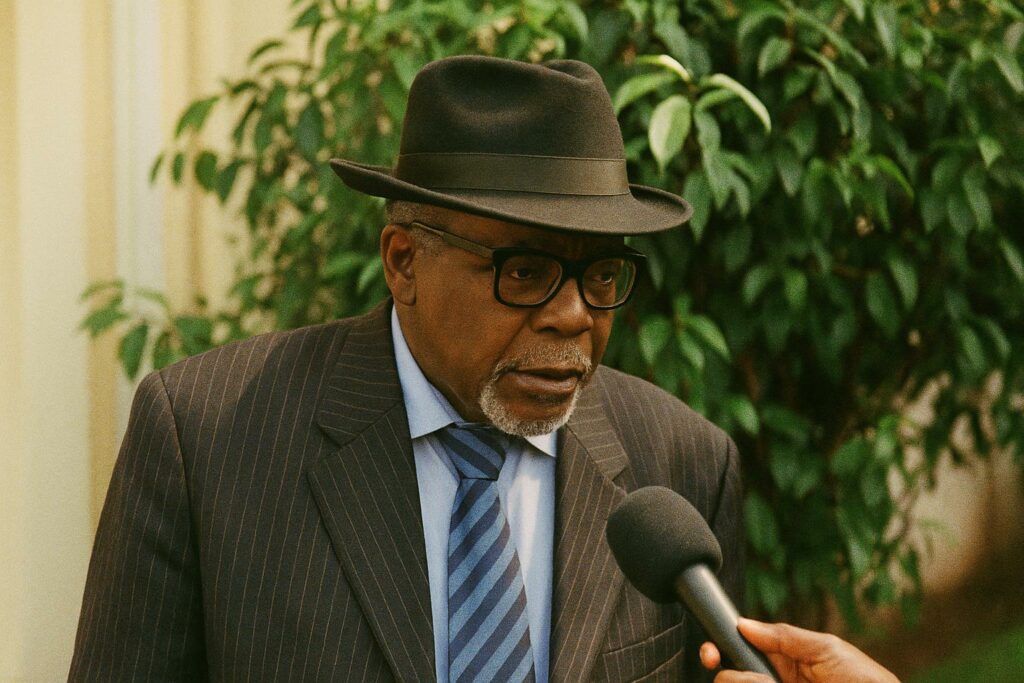A Cultural Diplomat Ascends the Political Ladder
Before entering the cabinet, Martin M’Beri was best known as a musicologist who helped professionalise Brazzaville’s National Ballet in the late 1970s (UNESCO archives, 1991). The red carpets of cultural festivals introduced him to foreign ministers and heads of state, endowing him with a rare fluency in both artistic and diplomatic language. When he joined President Denis Sassou-Nguesso’s first administration in 1984 as Minister of Culture, he turned cultural performance into soft-power outreach, dispatching orchestras to Lagos and Paris at a time when Congo’s economy was faltering under oil price shocks.
His trajectory from orchestra conductor to Minister of State in charge of National Reconciliation underscored the permeability of Congo’s political elite. What observers sometimes dismissed as eclecticism was, for M’Beri, the foundation of a conciliatory temperament that colleagues regarded as disarming even in the bitter aftermath of the 1997 civil war (Jeune Afrique, 2002).
Architect of the 2001 Reconciliation Forum
Tasked with organising the post-war National Dialogue in March 2001, M’Beri had to coax former combatants, church leaders and exiled politicians back into the same hall. Minutes from preparatory meetings indicate that he insisted on alphabetical seating to avoid protocol disputes—an anecdotal detail that speaks volumes about his grasp of Congolese sensitivities (Commission nationale d’organisation, 2001).
The forum produced the amnesty law of 2003 and paved the way for demobilisation support funded by the World Bank. Critics later argued that the Dialogue failed to deliver a new constitutional order, yet even sceptics concede that it lowered the temperature in Pool region where militias had paralysed the railway to Pointe-Noire (International Crisis Group, 2004).
June 5 Echoes and the Burden of Collective Memory
M’Beri’s death on 5 June 2025 instantly invited comparisons with 5 June 1997, the day hostilities erupted between forces loyal to then-President Pascal Lissouba and Sassou-Nguesso. In the Congolese political imagination, dates are rarely coincidences; they are interpretive devices. Editorials in Brazzaville’s independent daily La Semaine invoked ‘karma’, while state television confined itself to a terse obituary, a calibration that betrayed unease over emerging analogies (RFI, 2025).
A dispassionate reading suggests that the coincidence nonetheless offers President Sassou-Nguesso an opportunity to re-frame the upcoming electoral cycle through the lens of reconciliation rather than rival candidacies. Whether that symbolism will translate into concrete institutional reform remains uncertain.
Between Moral Appeal and Political Calculus
M’Beri’s final public interventions, notably a March 2025 memo to the presidency leaked to the press, pleaded for an inclusive dialogue before the 2026 vote. He warned that ‘electoral choreography without prior catharsis would seed new grievances’. Government spokespeople acknowledged receipt but questioned the timeline, arguing that economic priorities competed for fiscal space (Agence d’Information d’Afrique Centrale, 2025).
Opposition figures, including former finance minister Mathias Dzon, quickly appropriated M’Beri’s words, casting them as a posthumous indictment of the status quo. Yet diplomats in Brazzaville note that the late minister never advocated regime change; he advocated procedural legitimacy. His complexity defies the binary lenses that often colour external reporting on Congo.
Looking Ahead to the 2026 Presidential Poll
The constitutional amendment of 2015 removed age limits, allowing the 81-year-old president to seek renewed mandates. In private, Western envoys concede that only a negotiated framework, resembling M’Beri’s 2001 blueprint, could lend the 2026 election a measure of credibility. Without it, abstention rates—already 66 percent in the 2022 legislative race—may climb further, eroding the social contract in urban centres such as Pointe-Noire where youth unemployment hovers near 40 percent (World Bank, 2024).
Whether the Palais du Peuple will convene another dialogue hinges on political cost-benefit analysis: the ruling Parti Congolais du Travail fears that too broad a platform could dilute its incumbency advantage, yet donors increasingly condition budgetary support on governance benchmarks. In that delicate equilibrium, the memory of M’Beri may serve as both moral compass and strategic lever.
Regional Ripples and Diplomatic Takeaways
Beyond Congo’s borders, M’Beri’s passing has rekindled debates on reconciliation mechanisms across Central Africa. The African Union’s Peace and Security Council, meeting in Addis Ababa shortly after his burial, cited his 2001 forum as a ‘case study in indigenous conflict-resolution’ applicable to post-coup Gabon (AU communiqué, 2025). Regional diplomats see in his legacy a reminder that dialogue, to be effective, must be owned locally yet validated internationally.
For partners such as the European Union, whose Multi-Annual Indicative Programme for Congo allocates €72 million to governance, M’Beri’s memory could justify renewed technical assistance for electoral management. The United States, recalibrating its policy under the Global Fragility Act, similarly views inclusive dialogue as a risk-mitigation tool against insurgency spill-overs from the Central African Republic. Thus the impact of one man’s life – and the symbolism of his death – extends well beyond Brazzaville’s corniche.

